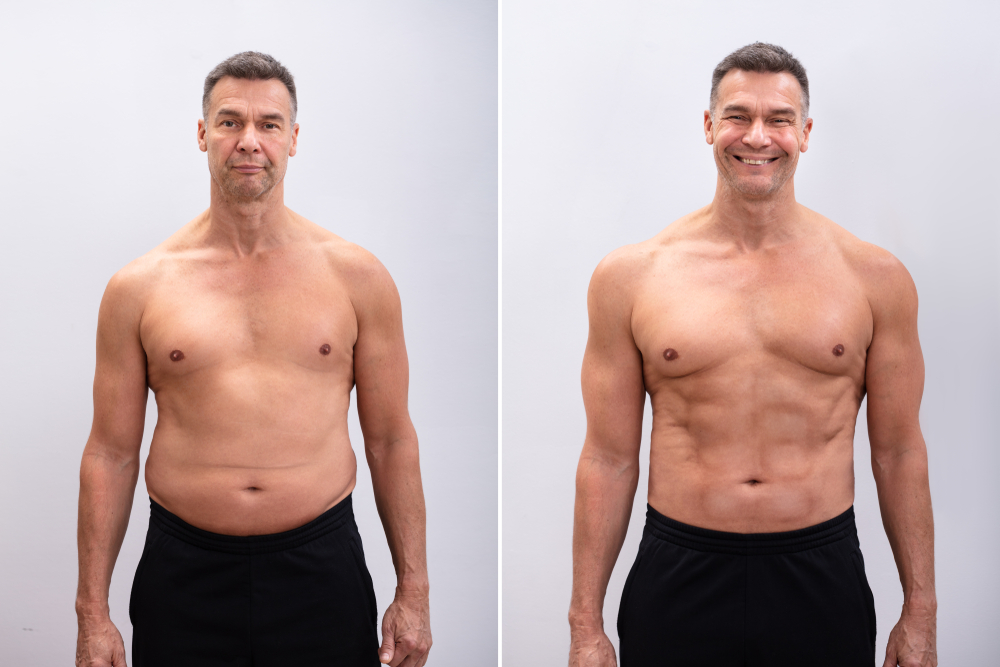
Testosterone Replacement Therapy (TRT) and Metabolism
Can TRT Rev Your Metabolism to Lose Weight?
It can’t be repeated enough: hormones are one of, if not the most, integral aspects of biology. There are whole fields of study and research that delve into learning, at a microbiological level, how hormones affect various biological processes, physiology, health, etc. Doctors commit themselves to specialize in endocrinology to solely tend to and care for patients affected by hormonal imbalances. Repeated ad nauseum in many other articles and topics we’ve addressed, hormones just can’t be avoided. While they may feel intangible and perhaps even worthy of dismissal to the uninitiated, we would be incomplete, incapable, and insignificant without our hormones.
What we understand hormones to be are key signallers that relay instructions to our cells that, therein themselves, follow these prompts and behave accordingly to the levels of circulating hormones in our system. Our bodies have hormones that help us grow and develop; some hormones regulate appetite, other hormones are responsible for sleep, some facilitate our aging, others impact our metabolism, and there are so many more that it’d be more prudent to study endocrinology to scratch the surface.
As early as 1905, Professor Ernest Starling was the first to conceive of hormones, and since then, his seminal work aroused more attention and research into these chemical messengers. Atop of just improvements in scientific understanding, hormones have elucidated great benefits for society, such as contraceptives and IVF. We’ve even learned and can recognize the impacts of certain human-made chemicals that interfere and affect our hormones.
The Sex Hormone: Testosterone
Advancements made towards human health concerning IVF and contraceptives largely depended upon recognizing the difference between key sex hormones estrogen and testosterone. These sex hormones are found in both men and women, though at different concentrations. A popular misconception exists that sex hormones are either specific to men or women. Still, the truth is that both sexes rely upon varying amounts of testosterone and estrogen to function.
Despite testosterone’s association with men, testosterone is a hormone that largely affects men and women, especially regarding metabolism and weight loss. Described below is the exploration of how testosterone and testosterone replacement therapy can help revitalize one’s metabolism to facilitate healthy and effective weight loss.
Failings of Low T
Again, despite being the primary sex hormone in men produced in the testes, testosterone is found in both men and women. And although different in concentration, testosterone proves to affect body composition. Studies have pinpointed testosterone as an important hormone that affects the metabolization of carbs, fats, and proteins. Testosterone deficiencies in men have illuminated associations with an increase in fat mass and impaired insulin sensitivity.
An impairment of the insulin uptake in the body results in insulin being unable to decrease blood sugar levels in the body effectively. Consequently, when glucose can’t be moved from the blood into neighbor cells for fuel utilization, the glycogen is stored in the body as fat. Therefore, high insulin levels impede fat from being broken down for energy, affecting one’s ability to lose weight. This only creates a positive feedback loop where the more fat cells there is less circulating testosterone to be found; it’s a vicious cycle where falling testosterone levels lead to a lower testosterone baseline in the body.
Findings of Testosterone Replacement Therapy
Allowed to continue, conditions like progressive hypogonadism can arise where sex organs like the testes fail to create testosterone. Studies in 2006 explored the role of testosterone replacement therapy on men affected by hypogonadism; early findings in the first few months of the study showed that patients had greater glucose disposal and lower insulin levels. These findings were compounded upon months later by injecting patients with 200mg of testosterone esters once every two weeks for a span of three months. Significant findings showed that TRT resulted in improved insulin sensitivity and decreases in waist circumference, leptin levels, and cholesterol.
Testosterone, TRT, and Metabolism
What allows men their more naturally obtainable muscular physique than women is the abundance of testosterone created from the testes. Men’s primary sex hormone send’s the body clear signals to amplify the body’s metabolism for muscle production. On the surfaces of our muscles are special receptors called androgen receptors that bind circulating levels of testosterone molecules. Once bound, a reaction is set off where signals from the receptor travel into muscle cells, instructing the cell to create more protein. These proteins can be synthesized for muscle repair and growth — and for those with greater testosterone levels, the easier it is to synthesize muscle mass.
Consequently, given the energy needs of muscle over fat cells, the greater the amount of muscle on a body, the greater the energy demands are to maintain the muscle cells. This directly results in an increased metabolic baseline. By increasing the metabolic baseline of an individual, more calories need to be burned to satisfy our body’s maintenance needs.
So given what we know of testosterone’s role in the body, especially towards fat cells versus muscle cells, it begins to make sense how an imbalanced level of testosterone results in a cycle of less T-hormone, more fat cell proliferation, decreased muscle mass, and a less-active metabolism. And then, given how the more fat one gains, the greater the risk of developing hypogonadism occurs.
Through the common practice of hormone therapy, specifically testosterone replacement therapy, those with testosterone imbalances can get their hormones back to normal. At Vitality Aesthetic and Regenerative Medicine, expert consultation can reveal testosterone levels, allowing for specially curated treatment plans for every individual. If exercise and diet seem to be failing you while weight continues to increase, one should potentially suspect a hormone problem at play. TRT treatments will get your body and weight back on track.

